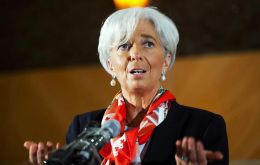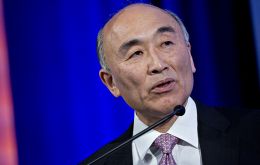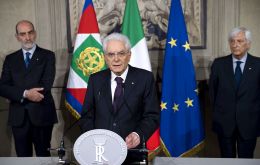MercoPress. South Atlantic News Agency
Tag: IMF
-
Friday, July 20th 2018 - 07:21 UTC
Argentina finances improving: half year primary deficit drops to 0.8% of GDP

Argentina posted a primary fiscal deficit of 105.8 billion pesos (US$3.7 billion), or 0.8% of gross domestic product (GDP) in the first half of 2018, government data showed on Thursday, down 26.7% from the same period last year.
-
Wednesday, July 18th 2018 - 07:38 UTC
Argentina consumer prices rose 3.7% in June and reach 29.5% in twelve months

Consumer prices rose 3.7% in June in Argentina, official data showed on Tuesday. That brought 12-month inflation to 29.5%, up from 26.3% in the 12 months through May, the INDEC national statistics bureau announced, which makes it the highest monthly recorded figure of the last two years.
-
Thursday, June 21st 2018 - 08:03 UTC
IMF Executive Board approves US$50bn Stand-By Arrangement for Argentina

The Executive Board of the International Monetary Fund (IMF) approved on Wednesday a three-year Stand-By Arrangement (SBA) for Argentina amounting to US$50 billion (equivalent to SDR 35.379 billion, or about 1,110 percent of Argentina’s quota in the IMF).
-
Wednesday, June 6th 2018 - 08:45 UTC
China and Argentina reinforce financial links with increased currency swap arrangement

Argentina is looking to expand an existing currency swap arrangement with China, as Buenos Aires looks to stabilize the economy one month after applying for financial aid from the International Monetary Fund. In an interview with the Financial Times, Argentina’s Chief of Cabinet Marcos Peña, said “we have an active swap with China that the previous government left us and we will try to make it bigger.”
-
Monday, June 4th 2018 - 08:49 UTC
Colombia renews flexible credit line of US$ 11.4bn with IMF

In a continuation of a previous arrangement, the International Monetary Fund (IMF) has approved Colombia for a flexible credit line of US$ 11.4 billion. The new two-year arrangement replaces the pre-existing credit line, which has now been cancelled. Colombia will continue to see the funds as precautionary to be used only in if economic conditions worsen due to an external shock or other emergency, according to the IMF.
-
Thursday, May 31st 2018 - 09:01 UTC
Argentine Senate votes 37 to 30 to freeze utility rates; Macri expected to veto the bill

Following twelve hours of heated and at time acrimonious debate the Argentine Senate on early Thursday voted, 37 to 30, to freeze utility prices. President Mauricio Macri had anticipated that if the bill was passed he would veto it because there is no way the budget can stand an additional 1% of GDP deficit.
-
Tuesday, May 29th 2018 - 09:09 UTC
The Way Out of Argentina’s New Crisis

The late MIT economist Rüdiger Dornbusch used to tell his students in the 1980s that there are four kinds of countries: rich, poor, Japan, and Argentina. No one frets anymore about Japan buying its way to world domination. But the world is worrying again about Argentina.
-
Tuesday, May 29th 2018 - 08:11 UTC
Italy's Mattarella appoints ex IMF interim prime minister and quells the situation... for now

Italy's president set the country on a path back to fresh elections on Monday, appointing a former International Monetary Fund official as interim prime minister with the task of planning for snap polls and to pass the next budget. The decision to appoint Carlo Cottarelli to form a stopgap administration sets the stage for elections that are likely to be fought over Italy's role in the European Union and the euro zone, a prospect that is rattling global financial markets.
-
Saturday, May 26th 2018 - 09:11 UTC
IMF/Argentina discussions to stabilize the economy are “progressing well”

“We are really moving ahead and we have committed to President Macri that we will do the best we can in order to move expeditiously and efficiently in order to change the perception about Argentina and the perception that people have about our role,” Ms Lagarde said in Russia.
-
Saturday, May 26th 2018 - 08:54 UTC
Argentine church independence message: sigh of relief for embattled Macri

A sigh of relief from Argentine president Mauricio Macri and his administration following on Friday's Tedeum by the Archbishop of Buenos Aires, which marks the Church' message on May 25, the symbolic celebration of the first independence efforts during the 1810 Revolution.
